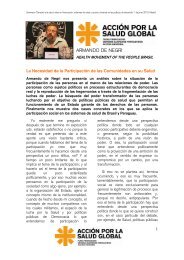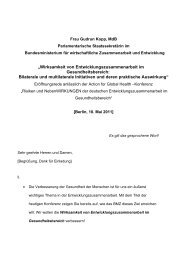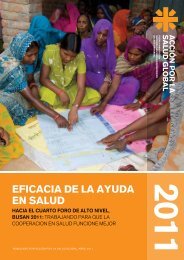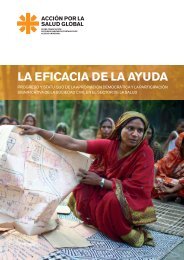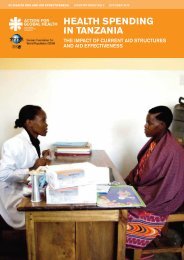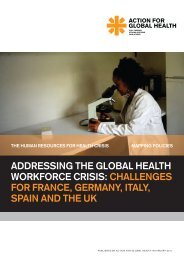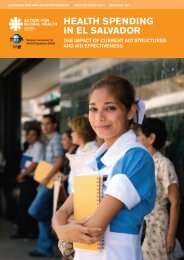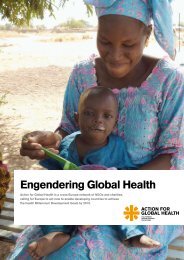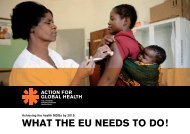Ethiopia Aid effectiveness in the health sector - Action for Global ...
Ethiopia Aid effectiveness in the health sector - Action for Global ...
Ethiopia Aid effectiveness in the health sector - Action for Global ...
Create successful ePaper yourself
Turn your PDF publications into a flip-book with our unique Google optimized e-Paper software.
<strong>Ethiopia</strong> – <strong>Aid</strong> Effectiveness <strong>in</strong> <strong>the</strong> <strong>health</strong> <strong>sector</strong><br />
come at <strong>the</strong> expense of <strong>the</strong> Government engagement with Parliament and<br />
civil society. 20<br />
The number of ‘dialogue spaces’ and donor representatives should be limited<br />
to reduce red tape. In fact, <strong>in</strong> 2007 <strong>the</strong> Government <strong>in</strong><strong>for</strong>med <strong>the</strong> DAG that it<br />
wanted to streaml<strong>in</strong>e <strong>the</strong> coord<strong>in</strong>ation structures and replace <strong>the</strong> TWGs with<br />
five Sectoral Work<strong>in</strong>g Groups (SWGs): Rural Development and Food Security,<br />
Private Sector, Transport, Gender, and Water. In response, <strong>the</strong> DAG has created<br />
some SWGs, while some of <strong>the</strong> TWGs are still engaged <strong>in</strong> discussions with <strong>the</strong>ir<br />
Government counterparts.<br />
DP partners should strive to conclude <strong>the</strong>se discussions as soon as possible.<br />
However, <strong>the</strong> DAG has stated that it will cont<strong>in</strong>ue to work <strong>in</strong>ternally on <strong>the</strong> basis<br />
of <strong>the</strong> 11 TWGs. Even though this process is still at an early stage, it is difficult to<br />
see how this reaction will help improve coord<strong>in</strong>ation and alignment and not<br />
hamper dialogue. Fur<strong>the</strong>rmore, it has been two years s<strong>in</strong>ce <strong>the</strong> Government<br />
requested that <strong>the</strong> DAG streaml<strong>in</strong>e <strong>the</strong> dialogue spaces and this process is still<br />
underway. This suggests that DPs are ei<strong>the</strong>r not very keen on <strong>the</strong> process or <strong>the</strong>y<br />
have not yet managed to agree on distribution of tasks.<br />
After <strong>the</strong> 2005 elections, DPs made significant changes to aid modalities <strong>in</strong><br />
<strong>Ethiopia</strong>. Many DPs moved away from budget support and decided to pool<br />
<strong>the</strong>ir funds <strong>in</strong>stead. Some donors who were work<strong>in</strong>g <strong>in</strong> <strong>Ethiopia</strong> when budget<br />
support was on <strong>the</strong> rise mentioned that <strong>the</strong> results were far beh<strong>in</strong>d <strong>the</strong><br />
experiences of Ghana, Mozambique and Tanzania. <strong>Ethiopia</strong> is a federal<br />
country and <strong>the</strong> Government is completely decentralised. There is only a<br />
central budget <strong>for</strong> defence and <strong>for</strong>eign affairs and <strong>the</strong> rest of funds are<br />
transferred to district authorities, accord<strong>in</strong>g to rules based on population, etc.<br />
This made it difficult <strong>for</strong> donors to track <strong>the</strong>ir money, especially when <strong>the</strong>y had a<br />
target <strong>sector</strong> <strong>for</strong> budget support. Even though DPs wanted to support <strong>the</strong><br />
<strong>health</strong> <strong>sector</strong>, <strong>in</strong> practice district authorities received <strong>the</strong>ir entire budget and<br />
redistributed funds at will. Bear<strong>in</strong>g <strong>in</strong> m<strong>in</strong>d that <strong>the</strong>re are 611 districts or woredas,<br />
monitor<strong>in</strong>g funds would have been a titanic task.<br />
The Government is probably aware of <strong>the</strong>se difficulties. In <strong>the</strong> IHP+ Compact it<br />
states that <strong>the</strong> preferred <strong>in</strong>strument <strong>for</strong> DPs’ support to <strong>the</strong> <strong>health</strong> <strong>sector</strong> is not<br />
budget support but a basket fund managed by <strong>the</strong> M<strong>in</strong>istry of Health (MoH),<br />
<strong>the</strong> MDG Fund. In <strong>the</strong>ory, <strong>the</strong> MDG Fund should replace <strong>the</strong> exist<strong>in</strong>g Protection<br />
of Basic Services (PBS) scheme. But DPs are not very keen on this because of<br />
<strong>the</strong> political consequences of provid<strong>in</strong>g direct support to <strong>the</strong> Government after<br />
<strong>the</strong> last elections as well as <strong>the</strong> new controversial Charity Law (see below).<br />
A major obstacle to achiev<strong>in</strong>g a higher degree of harmonisation <strong>in</strong> <strong>Ethiopia</strong> is<br />
<strong>the</strong> lack of commitment from <strong>the</strong> country’s largest donors: USAID, PEPFAR and<br />
<strong>the</strong> <strong>Global</strong> Fund. The volume of aid of all o<strong>the</strong>r donors to <strong>the</strong> <strong>health</strong> <strong>sector</strong><br />
12



